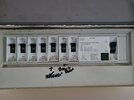My house putting a clamp on ammeter across both the DNO tails I measure around 18 mA, not enough to trip an RCD but well over the recomended 9 mA if I have any items leaking around 9 mA with a single RCD it would trip.
So I have 14 RCD's which are combined with my MCB's the combined unit is called a RCBO.
When the RCD first came out in domestic installations we used 100 mA models, often with delayed tripping, (S type) but one could still get a nasty shock, so we moved to 30 mA, but to stop nuisance tripping we split the distribution box, some times with only sockets protected, other times using two RCD's and then into 3 with so many items on each of two RCD's and are some items either MCB only or RCBO's.
As the price of RCBO's dropped, we moved in the main to all RCBO's but nothing to stop cheap skates sticking with either one or two RCD's, but of course one has to expect it to trip every so often.
When I came to do this house, I decided if I loose the contents of a freezer it will cost more than the extra to fit an all RCBO consumer unit (type tested distribution unit) cost about £200 more, and no one forced me to buy one, but it made sense.
At the same time I upgrades to 100 amp so if I decided to go for electric heating or electric vehicle I can, and also added a surge protection device.
But all this does not help when a MCB trips, a ring final is normally 30 or 32 amp, and can feed loads of 13 amp sockets, so easy to overload, so the IET recomend any non portable appliances (portable under 14 kg or on wheels) using more than 2 kW should have a dedicated supply.
In real terms we do have a dedicated supply for the immersion heater, but the tumble drier, or washer drier which are likely the next most likely to overload the circuit.
The cooker is normally over 13 amp, so normally a dedicated circuit, but as the eye level oven came in, we started to plug them in, my own house I have two kettles 13 amp each to speed up making coffee, only on for 45 and 60 seconds, but still an overload. And often we do overload a circuit for a very short time and get away with it.
But you need to add up what you have 230 watt = 1 amp.


